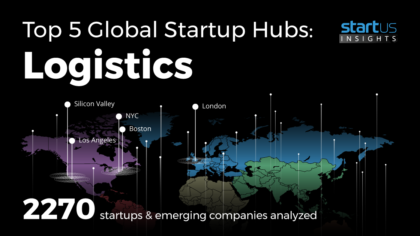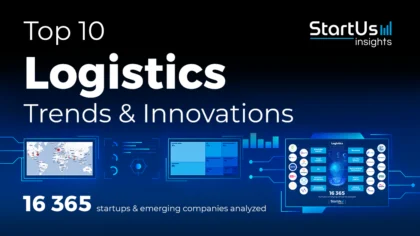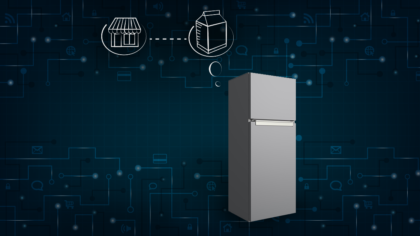The logistics industry is going through rapid change due to advancements in technology-driven solutions. An increasing number of solutions focus on reducing costs for the sector by enabling the sharing of services, especially in last-mile delivery and standardization of freight services. However, emerging companies still contend with challenges arising from integrating the physical internet with existing logistics models. In addition, startups face the key challenge of scaling their solutions for the broader adoption of the various technology trends in the logistics industry like the internet of things (IoT), advanced robotics, and advanced analytics.
Top 5 Global Startup Hubs: Logistics
Using our StartUs Insights Platform covering more than 1.116.000 startups and emerging companies, we analyzed the geographic distribution of global activity in the logistics industry. We identified 60 regional hubs* that observe high activity in developing technology-driven solutions across the industry like drone deliveries, robotics and automation, and advanced analytics, to name a few.
Within these hubs, we analyzed a sample of 2.270 startups and emerging companies employing technology-driven solutions to innovate in the industry. Silicon Valley, New York City, London, Los Angeles, and Boston are home to 680 startups and emerging companies* and account for 30% of global logistics activity. Let us have a look at some of the innovative solutions from these 5 top hubs.
Based on our analysis of a sample of 2.270 startups & emerging companies, we observe that North America is home to almost half of global activity in the logistics sector. Several large logistics hubs in the US are driven by friendlier regulations regarding drone delivery and greater adoption of shared last-mile delivery services.
European logistics hubs in London, Paris, Amsterdam, and Berlin, along with Tel Aviv, account for a third of global activity. Emerging Asian logistics hubs in Dubai and across India, as well as well established systems in Singapore and China, lead the region’s activity in the sector.
1. Silicon Valley: 247 Startups
The growing number of innovation hubs and clusters around the world threatens to make life difficult for emerging Silicon Valley companies. The center of digital innovation, the region faces increasing pressure for affordable housing and traffic decongestion, as well as a potential loss of the immigrant talent pool. Despite this, the region is currently home to the highest number of startups developing solutions for the logistics industry.
The San Francisco-based startup Boundary Layer Technologies develops and builds hydrofoil cargo ships. These small-sized cargo ships are capable of operating at twice the on-water speed of normal ships. One of the key factors that allow hydrofoil ships to travel faster is the reduction in drag as the ship increases speed. As a result, hydrofoils reduce costs and produce relatively lower levels of pollution when compared to conventional cargo ships.
2. New York City: 148 Startups
The last few years have thrown tough challenges towards New York City’s trade and logistics sector. Low productivity, high costs of operations, and geopolitical uncertainty force startups to develop unique solutions for the region. New York City also provides a challenging testing ground for the biggest and the emerging companies, especially in last-mile delivery, port operations, freight, and cargo.
EVA is a New York City startup that designs and develops the Vertical Station, an all-in-one drone infrastructure. Capable of handling all types of commercial drone deliveries, including healthcare and parcels, this drone-agnostic drone infrastructure enables easy last-mile delivery. The drone station uses grid or off-grid power, either from hydrogen or solar, to power up to 24 drones of varying sizes and purposes. The station also includes full ground control and IoT connectivity to automate drone dispatch. Moreover, the entire station fits into a container that can be transported by trucks, trains, and ships.
3. London: 123 Startups
London is in the midst of significant changes to the logistics sector. Growing congestion inside the city and the sheer volume of trade movement cause delays in ensuring timely logistics. Apart from contending with inefficiencies within the sector, companies also face government regulations that aim to reduce their environmental impact. From city authorities to startups, the focus of this logistics hub is to ensure a well-planned system as the city looks to expand and develop the logistics infrastructure.
London-based startup Intelligent Robotics develops autonomous mobile robots for multiple industries, including logistics and warehousing. The RPUCK robotic solution uses IoT sensors, artificial intelligence (AI), and advanced algorithms to continuously adapt as warehouse processes change. This gives the system the flexibility to work around complex or unpredictable situations. The robots autonomously navigate between picking, packing, and sorting stations. In addition, RPUCK aims to complement employee effort and increase operational efficiency by automating material transport.
4. Los Angeles: 105 Startups
Southern California has one of the largest consumer markets in the US. Well established infrastructure for freight and trade movement in combination with high-quality education institutions allows the region to emerge as a top logistics hub. Startups are working to develop strong intermodal links between warehouses and logistics transportation. In addition, the region’s emerging companies develop solutions to increase efficiencies and productivity, maximize capacity, and cut costs through innovations in technology.
T5tek is a startup operating from Los Angeles providing a suite of IoT-based smart asset tracking solutions for trailers and containers. The eCAT mist mesh network integration allows for monitoring the driver, cabin, truck, trailer, and chassis. The eLokk is a standalone intelligent GPS tracking solution with a physical lock designed to protect assets inside trailers. It prevents door intrusion into the trailer and detects motion, tilting, impact, as well as tampering. The T5 Fleet IoT Command (FIC) is the dashboard interface for information interpretation, storage, access, and visualization.
5. Boston: 56 Startups
One of the major challenges facing the logistics industry in Boston is regarding finding the right talent. Most of the inefficiencies can be tied to the lack of investments in middle-skill employment. Comprising either high-skilled workers like software developers or low-skilled like material movers, the region provides an ideal situation for testing new technologies. Startups and emerging companies work to develop or transfer some of the region’s advanced robotics and analytics capabilities to the logistics industry.
Boston-based Pickle Robot Company designs and develops Dill, a collaborative and autonomous parcel handling robot. Offering a small form factor and easy mobility, workers are able to supervise multiple Dill robots, in turn improving productivity. Moreover, these robots are capable of learning as they perform tasks, making them more efficient. Additionally, they are equipped to perform warehousing tasks like picking from hampers, loading, and unloading from pallets and sorting into bins and cabinets.
What’s Next?
With increasing levels of uncertainty in global supply chains, governments and emerging companies alike are working to develop less-complex solutions to maintain logistics services. With industries like healthcare, manufacturing, and retail beginning to adopt innovative technologies in their supply chains, logistics hubs continue to expand in size and numbers. This results in an increasing number of technology-driven startups competing to provide the most optimal solutions for the sector.
*We define a hub as the regional geographic center of activity for this topic. It covers the center point with a radius of 100km. We define startups and emerging companies as those founded after 2015.









